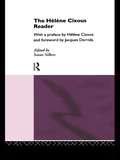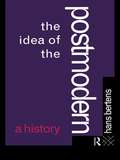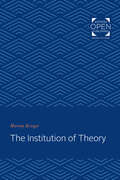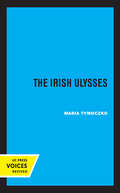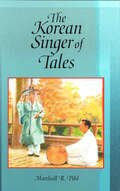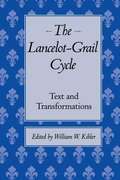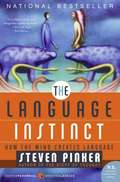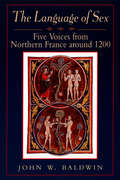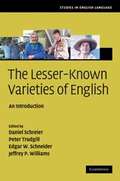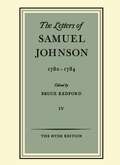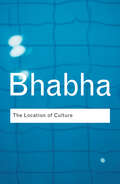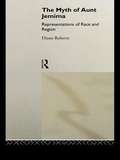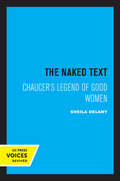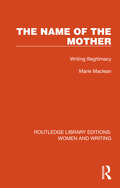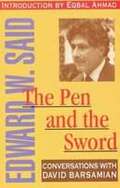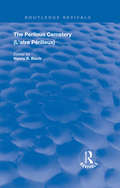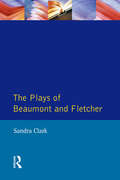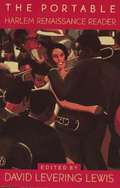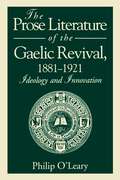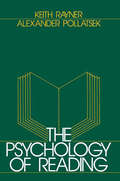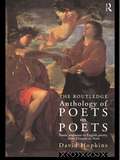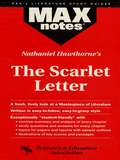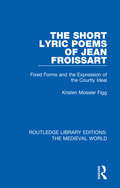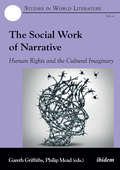- Table View
- List View
The Hélène Cixous Reader
by Susan SellersThis is the first truly representative collection of texts by Helene Cixous. The substantial pieces range broadly across her entire oeuvre, and include essays, works of fiction, lectures and drama. Arranged helpfully in chronological order, the extracts span twenty years of intellectual thought and demonstrate clearly the development of one of the most creative and brilliant minds of the twentieth century.With a foreword by Jacques Derrida, a preface by Cixous herself, and first-class editorial material by Susan Sellers, The Helene Cixous Reader is destined to become a key text of feminist writing.
The Idea of the Postmodern: A History
by Hans BertensAt last! Everything you ever wanted to know about postmodernism but were afraid to ask.Hans Bertens' Postmodernism is the first introductory overview of postmodernism to succeed in providing a witty and accessible guide for the bemused student. In clear and straightforward but always elegant prose, Bertens sets out the interdisciplinary aspects, the critical debates and the key theorists of postmodernism. He also explains, in thoughtful and illuminating language, the relationship between postmodernism and poststructuralism, and that between modernism and postmodernism.An enjoyable and indispensible text for today's student.
The Institution of Theory
by Murray KriegerOriginally published in 1994. In The Institution of Theory, Murray Krieger examines, at once sympathetically and critically, the process by which theory has become institutionalized in the American academy and the consequences of theory as an academic institution. He traces the transformation of literary theory into critical theory and relates it to changes in the place of literature within questions about discourse at large. And he faces the costs as well as the gains of the recent denial of privilege to the literary. To support his view of the issues at stake in current theoretical debates, Krieger surveys both the history of American criticism and the general history of literary theory in the West. He sees divisions in each of them that foreshadow the current debates: in the first a conflict between the social and the aesthetic functions of literature, and in the second a conflict between the treatment of literature as a reflection of a culture's ideology and the treatment of literature as a subversion of that ideology. To what extent, he asks, are our debates new and to what extent are they merely refashioned versions of those we have always had?
The Irish Ulysses
by Maria TymoczkoThis title is part of UC Press's Voices Revived program, which commemorates University of California Press’s mission to seek out and cultivate the brightest minds and give them voice, reach, and impact. Drawing on a backlist dating to 1893, Voices Revived makes high-quality, peer-reviewed scholarship accessible once again using print-on-demand technology. This title was originally published in 1994.
The Korean Singer of Tales (Harvard-Yenching Institute Monograph Series #37)
by Marshall R. PihlP'ansori, the traditional oral narrative of Korea, is sung by a highly trained soloist to the accompaniment of complex drumming. The singer both narrates the story and dramatizes all the characters, male and female. Performances require as long as six hours and make extraordinary vocal demands. In the first book-length treatment in English of this remarkable art form, Pihl traces the history of p'ansori from its roots in shamanism and folktales through its nineteenth-century heyday under highly acclaimed masters and discusses its evolution in the twentieth century. After examining the place of p'ansori in popular entertainment and its textual tradition, he analyzes the nature of texts in the repertoire and explains the vocal and rhythmic techniques required to perform them.Pihl's superb translation of the alternately touching and comic "Song of Shim Ch'ong"—the first annotated English translation of a full p'ansori performance text—illustrates the emotional range, narrative variety, and technical complexity of p'ansori literature. The Korean Singer of Tales will interest not only Korean specialists, but also students of comparative literature, folklore, anthropology, and music.
The Lancelot-Grail Cycle: Text and Transformations
by William W. KiblerComposed in Old French between about 1220 and 1240, the Lancelot-Grail Cycle is a group of five prose romances centered on the love affair between Lancelot and Guenevere. It consists of an immense central core, the Lancelot Proper, introduced by The History of the Holy Grail and The Story of Merlin and concluded by The Quest for the Holy Grail and The Death of Arthur. <P><P> This volume brings together thirteen essays by noted scholars from the first symposium ever devoted exclusively to the Lancelot-Grail Cycle. Exploring the cycle's evolution across the literatures of medieval France, Italy, Spain, Catalonia, and England, the authors take a variety of approaches that highlight a broad range of cultural, social, historical, and political concerns and offer a comparative and interdisciplinary vision of this great romance.
The Language Instinct: How the Mind Creates Language
by Steven PinkerIn this classic, the world's expert on language and mind lucidly explains everything you always wanted to know about language: how it works, how children learn it, how it changes, how the brain computes it, and how it evolved. With deft use of examples of humor and wordplay, Steven Pinker weaves our vast knowledge of language into a compelling story: language is a human instinct, wired into our brains by evolution. The Language Instinct received the William James Book Prize from the American Psychological Association and the Public Interest Award from the Linguistics Society of America. This edition includes an update on advances in the science of language since The Language Instinct was first published.
The Language of Sex: Five Voices from Northern France around 1200
by John W. BaldwinThis study brings together widely divergent discourses to fashion a comprehensive picture of sexual language and attitudes at a particular time and place in the medieval world. John Baldwin introduces five representative voices from the turn of the twelfth century in northern France: Pierre the Chanter speaks for the theological doctrine of Augustine; the Prose Salernitan Questions, for the medical theories of Galen; Andre the Chaplain, for the Ovidian literature of the schools; Jean Renart, for the contemporary romances; and Jean Bodel, for the emerging voices of the fabliaux. Baldwin juxtaposes their views on a range of essential subjects, including social position, the sexual body, desire and act, and procreation. The result is a fascinating dialogue of how they agreed or disagreed with, ignored, imitated, or responded to each other at a critical moment in the development of European ideas about sexual desire, fulfillment, morality, and gender. These spokesmen allow us into the discussion of sexuality inside the church and schools of the clergy, in high and popular culture of the leity. This heterogeneous discussion also offers a startling glimpse into the construction of gender specific to this moment, when men and women enjoyed equal status in sexual matters, if nowhere else. Taken together, these voices extend their reach, encompass their subject, and point to a center where social reality lies. By articulating reality at its varied depths, this study takes its place alongside groundbreaking works by James Brundage, John Boswell, and Leah Otis in extending our understanding of sexuality and sexual behavior in the Middle Ages. "Superb work. . . . These five kinds of discourse are not often treated together in scholarly writing, let alone compared and contrasted so well. "—Edward Collins Vacek, Theological Studies "[Baldwin] has made the five voices speak to us in a language that is at one and the same time familiar and alien in its resonance and accents. This is a truly exceptional book, interdisciplinary in the real sense of the word, which is surely destined to become a landmark in medieval studies. "—Keith Busby, Bryn Mawr Reviews "[Baldwin's] attempt to 'listen' to these distant voices and translate their language of sex into our own raises challenging methodological questions that will be of great interest to historians and literary scholars alike. "—John P. Dalton, Comitatus
The Lesser-Known Varieties of English
by Daniel Schreier Peter Trudgill Edgar W. Schneider Jeffrey P. WilliamsThis is the first ever volume to compile sociolinguistic and historical information on lesser-known, and relatively ignored, native varieties of English around the world. Exploring areas as diverse as the Pacific, South America, the South Atlantic and West Africa, it shows how these varieties are as much part of the big picture as major varieties and that their analysis is essential for addressing some truly important issues in linguistic theory, such as dialect obsolescence and death, language birth, dialect typology and genetic classification, patterns of diffusion and transplantation and contact-induced language change. It also shows how close interwoven fields such as social history, contact linguistics and variationist sociolinguistics are in accounting for their formation and maintenance, providing a thorough description of the lesser-known varieties of English and their relevance for language spread and change.
The Letters of Samuel Johnson 1782-1784 (The Hyde Edition #Vol. IV)
by Samuel JohnsonThis epistolary endgame includes the breakup of the friendship with Hester Thrale, medical dramas of every description, and a poignant reaching out to new friends and new experiences. The letters of 1782-84 exemplify in abundance what Johnson himself praises and provides, 'the interchange of that social officiousness by which we are habitually endeared to one another.
The Location of Culture
by Homi K. BhabhaRethinking questions of identity, social agency and national affiliation, Bhabha provides a working, if controversial, theory of cultural hybridity - one that goes far beyond previous attempts by others. In The Location of Culture, he uses concepts such as mimicry, interstice, hybridity, and liminality to argue that cultural production is always most productive where it is most ambivalent. Speaking in a voice that combines intellectual ease with the belief that theory itself can contribute to practical political change, Bhabha has become one of the leading post-colonial theorists of this era.
The Myth of Aunt Jemima: White Women Representing Black Women
by Diane RobertsThe Myth of Aunt Jemima is a bold and exciting look at the way three centuries of white women writers have tackled the subject of race in both Britain and America. Diane Roberts challenges the widely-held belief that white women writers have simply acquiesed in majority cultural inscriptions of race. The Myth of Aunt Jemima shows how 'the mythic spheres of race, of the separation of black and white into low and high, other and originary, tainted and pure, remain to trouble a society struggling still to free itself from debilitating racial representations.' Beautifully written with a powerful series of textual readings, The Myth of Aunt Jemima pushes at the boundaries of thought around the issues of race and gender. An important and innovative book.
The Naked Text: Chaucer's Legend of Good Women
by Sheila DelanyA sequel to her seminal book on Chaucer’s House of Fame, Sheila Delany’s elegant and innovative study of Chaucer’s Legend of Good Women explores what it meant to be a reader and a writer, and to be English and a courtier, in the late fourteenth century. The richness of late medieval art, philosophy, and history are powerfully brought to bear on one of Chaucer’s most controversial works. So too are the insights of modern critical theory—semiotics, historicism, and gender studies especially—making this a unique achievement in medieval and Chaucerian studies. Delany’s strikingly original readings of Chaucer’s Orientalism, his sexual wordplay, his theological attitudes, and his treatment of sex and gender have given us a Chaucer for our time. This title is part of UC Press's Voices Revived program, which commemorates University of California Press’s mission to seek out and cultivate the brightest minds and give them voice, reach, and impact. Drawing on a backlist dating to 1893, Voices Revived makes high-quality, peer-reviewed scholarship accessible once again using print-on-demand technology. This title was originally published in 1994.
The Name of the Mother: Writing Illegitimacy (Routledge Library Editions: Women and Writing)
by Marie MacleanIn this original and highly accomplished study, first published in 1994, Marie Maclean studies the writings of social rebels and explores the relationship between their personal narratives and illegitimacy. The case studies which Maclean examines fall into four groups: those which stress alternative family structures and ‘female genealogies’; those which pair female illegitimacy and revolution; those which question the deliberate refusal of the name of the father by the legitimate; those which study the revenge of genius on the society which excludes it. Skilfully interweaving feminist theory, French literary criticism, social and cultural history, deconstruction and psychoanalytic theory, Maclean traces the place of these personal narratives of illegitimacy in history and their use in theory, from Elizabeth I to Freud, Sartre and Derrida. The Name of the Mother will be of vital interest and importance to any student of critical theory, feminist philosophy, French or cultural studies.
The Pen and the Sword: Conversations with David Barsamian
by Edward W. SaidEdward W. Said, raised in Jerusalem, is interviewed here on a range of subjects: from V.S. Naipaul's and Joseph Conrad's depictions of colonialism and empire in their novels; to the links between the Palestinian and South African struggles.
The Perilous Cemetery (Routledge Revivals)
by Nancy B. BlackPublished in 1994: In The Perilous Cemetery adventure, Gawain is required to fight the devil himself. In repayment for having cured a young woman of madness, the devil keeps her entombed in a grave by day and requires her by night to fulfil his sexual desires.
The Plays of Beaumont and Fletcher
by Sandra ClarkThis is an analysis of sexual themes in the plays of Beaumont and Fletcher, both in the context of the Jacobean theatre and in the light of modern readings of sexuality and gender during the English Renaissance. Sandra Clark challenges commonly-held perceptions of Beaumont and Fletcher's work. The book is intended for undergraduate and graduate courses on Renaissance literature, Elizabethan and Jacobean drama, tragicomedy, gender and genre in the Renaissance.
The Portable Harlem Renaissance Reader
by David Levering LewisGathering a representative sampling of the New Negro Movement's most important figures, and providing substantial introductory essays, headnotes, and brief biographical notes, Lewis' volume--organized chronologically--includes the poetry and prose of Sterling Brown, Countee Cullen, W. E. B. Du Bois, Zora Neale Hurston, James Weldon Johnson, and others.
The Prose Literature of the Gaelic Revival, 1881–1921: Ideology and Innovation
by Philip O'LearyThe Gaelic Revival has long fascinated scholars of political history, nationalism, literature, and theater history, yet studies of the period have neglected a significant dimension of Ireland's evolution into nationhood: the cultural crusades mounted by those who believed in the centrality of the Irish language to the emergent Irish state.This book attempts to remedy that deficiency and to present the lively debates within the language movement in their full complexity, citing documents such as editorials, columns, speeches, letters, and literary works that were influential at the time but all too often were published only in Irish or were difficult to access. Cautiously employing the terms "nativist" and "progressive" for the turnings inward and toward the European continent manifested in different authors, this study examines the strengths and weaknesses of contrasting positions on the major issues confronting the language movement. Moving from the early collecting or retelling of folklore through the search for heroes in early Irish history to the reworking of ancient Irish literary materials by retelling it in modern vernacular Irish, O'Leary addresses the many debates and questions concerning Irish writing of the period. His study is a model for inquiries into the kind of linguistic-literary movement that arises during intense nationalism.
The Psychology of Reading: A Special Issue Of The European Journal Of Cognitive Psychology (Oxford Library Of Psychology)
by Keith Rayner Alexander PollatsekThe last 20 years have witnessed a revolution in reading research. Cognitive psychologists, using high-speed computers to aid in the collection and analysis of data, have developed tools that have begun to answer questions that were previously thought unanswerable. These tools allow for a "chronometric," or moment-to-moment, analysis of the reading process. Foremost among them is the use of the record of eye movements to help reveal the underlying perceptual and cognitive processes of reading. This volume provides a coherent framework for the research accomplished on the reading process over the past 15 years. It emphasizes how readers go about extracting information from the printed page and how they comprehend the text.
The Reader as Detective: Level C (The Reader As Detective)
by Burton GoodmanThis book has been specially designed to make you a more active reader--to help you become more involved in the reading process. Today, more than ever, this is important because TV and movies can affect our reading habits. They, and other mass media, sometimes tend to make us passive, less active readers. This is unfortunate because reading is an active, participatory experience. It is not merely viewing or watching. When you read a powerful story of detection, suspense, mystery, or action, you march along with the characters in search of the ending, or solution. You are--or should become-- The Reader as Detective. Reading is an adventure--one in which you have become involved. Furthermore, the greater your involvement, the better reader you will become--and the more you will enjoy and appreciate reading. This book will help make you The Reader as Detective in a number of ways. A good reader is like a good detective in another way. To succeed, the detective must be able to gain an overall impression of the case, to recognize clues, identify important details, put events in sequence, draw inferences, and distinguish fact from opinion. Similarly, the effective reader must be a reading detective--on the search for the main idea, for supporting details, clues, inferences, and so forth.
The Routledge Anthology of Poets on Poets: Poetic Responses to English Poetry from Chaucer to Yeats
by David HopkinsThe Routledge Anthology of Poets on Poets collects together writings by all the major poetic figures from Chaucer to Yeats demonstrating their vivid responses to each other, ranging from elegiac eulogy to burlesque and satire. The anthology is arranged in two sections. Part One contains poets' writings on the nature, qualities and purpose of poetry Part Two is a chronological collection of poets' writings on their peers, with an individual entry for each poet. Each extract is presented in modernized spelling and punctuation, and is carefully annotated to provide full explanations of unfamiliar phrases and references. The index has been fully revised for this paperback edition. The Routledge Anthology of Poets on Poets will be stimulating and enjoyable for anyone interested in the history of English poetry, but will also be an invaluable collection of primary source material for students and their teachers.
The Scarlet Letter (MAXNotes Literature Guides)
by Michael PetrusREA's MAXnotes for Nathaniel Hawthorne's The Scarlet Letter The MAXnotes provides a comprehensive summary and analysis of The Scarlet Letter and a biography of Nathaniel Hawthorne. Places the events of the novel in historical context and discusses each chapter in detail. Includes study questions and answers along with topics for papers and sample outlines.
The Short Lyric Poems of Jean Froissart: Fixed Forms and the Expression of the Courtly Ideal (Routledge Library Editions: The Medieval World #12)
by Kristen Mossler FiggOriginally published in 1994, The Short Lyric Poems of Jean Froissart is a meticulous reading of the important but generally neglected short lyric poems of Jean Froissart. The book situates Froissart within the cultural and literary context of fourteenth-century Europe and examines a representative number of his lyric forms (pastourelles, chansons royales, ballades, virelais, and rondeaux) demonstrating their richness of theme and poetic virtuosity. The book provides a readable and reliable English translation, making it possible for English scholars unfamiliar with the original Middle French forms to understand and appreciate the influence Froissart had on Chaucer and other authors of the age. The book focuses on themes, techniques, meters, and rhythms that Froissart employed in his poetry, on how his poetry fits poetic tradition, and on the place of Froissart in literary history.
The Social Work of Narrative: Human Rights and the Cultural Imaginary (Studies in World Literature #4)
by Gareth Griffiths Philip MeadThis book addresses the ways in which a range of representational forms have influenced and helped implement the project of human rights across the world, and seeks to show how public discourses on law and politics grow out of and are influenced by the imaginative representations of human rights. It draws on a multi-disciplinary approach, using historical, literary, anthropological, visual arts, and media studies methods and readings, and covers a wider range of geographic areas than has previously been attempted. A series of specifically-commissioned essays by leading scholars in the field and by emerging young academics show how a multidisciplinary approach can illuminate this central concern.
